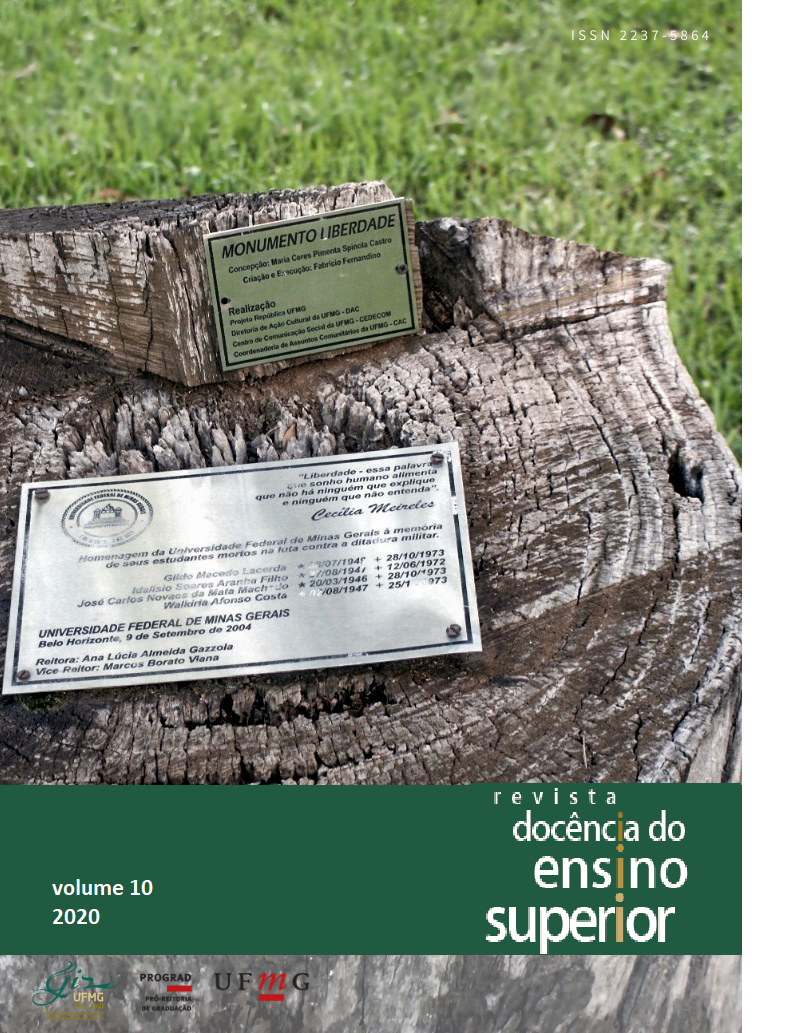Reflexões sobre a prática da interdisciplinaridade através da metodologia Project Based Learning
um estudo de caso no ensino de Engenharia
DOI:
https://doi.org/10.35699/2237-5864.2020.13597Palavras-chave:
Interdisciplinaridade, Educação Superior, Ensino na Engenharia, Aprendizagem Baseada em ProjetosResumo
Este trabalho objetiva apresentar os resultados de uma pesquisa de mestrado que buscou compreender como os professores da Educação Superior, envolvidos em projetos interdisciplinares, que trabalham com a metodologia Project Based Learning, concebem e vivenciam a interdisciplinaridade. Tratou-se de uma pesquisa qualitativa, do tipo estudo de caso, centrada em métodos e técnicas de recolha de dados que contemplaram os seguintes instrumentos: análise documental, entrevista semiestruturada e observação participante. As análises dos dados foram realizadas por meio dos princípios da análise de conteúdo. O conceito interdisciplinar trazido nesta investigação ancorou-se em uma perspectiva baseada na interdisciplinaridade para além da justaposição de disciplinas, pautada em uma relação entre conhecimentos e entre sujeitos, em que o diálogo, a parceria e o planejamento surgem como eixos fundamentais na construção de propostas pedagógicas interdisciplinares. Concluiu-se que, apesar das dificuldades enfrentadas pelos docentes no desenvolvimento de uma proposta interdisciplinar, eles revelam que a proposta possibilita uma aprendizagem significativa, que contribui para a formação do aluno, desvelando-se necessária para a formação integral do sujeito, demonstrando com isso a relevância da sua utilização na Educação Superior.
Downloads
Referências
AUSUBEL, David Paul. A aprendizagem significativa: a teoria de David Ausubel. São Paulo: Moraes, 1982.
BARDIN, Laurence. Análise de Conteúdo. Edições 70. São Paulo. 2011.
BRASIL, Lei de Diretrizes e Bases. Lei nº 9.394/96, de 20 de dezembro de 1996.
CUNHA, Maria Isabel da; ZANCHET, Beatriz Atrib. Educação e Linguagem. Sala de aula universitária e inovações: construindo saberes docentes. Educação & Linguagem. São Bernardo do campo, v. 10. n. 15, p. 227-249, jan-jun. 2007.
FAZENDA, Ivani. A Interdisciplinaridade: um projeto em parceria. São Paulo: Loyola, 1993.
FAZENDA, Ivani Catarina Arantes de. Dicionário em construção: Interdisciplinaridade. São Paulo: Cortez, 2002.
FAZENDA, Ivani Catarina Arantes de. Interdisciplinaridade: história, teoria e pesquisa. 14. ed. São Paulo: Papirus Editora, 2007.
FAZENDA, Ivani Catarina Arantes de. Integração e interdisciplinaridade no ensino brasileiro: Efetividade ou ideologia. São Paulo: Edições Loyola, 6. ed. 2011.
FREIRE, Paulo. Pedagogia da autonomia: saberes necessários à prática educativa. 8. ed. Rio de Janeiro: paz e Terra. 1998.
FLORES, Maria Assunção; SIMÃO, Ana Maria Veiga. Competências desenvolvidas no contexto do Ensino Superior: a perspectiva dos diplomados. In: Atas das V Jornadas de Redes de Investigación en Docencia Universitaria. Alicante, Espanha: Universidade de Alicante, 2007.
GHEDIN, Evandro. Professor reflexivo: da alienação da técnica à autonomia da crítica. In: PIMENTA, Selam Garrido; GHEDIN, Evandro (org). Professor reflexivo no Brasil: gênese e crítica de um conceito. 3 ed. São Paulo: Cortez, 2005.
JACOBS, Heidi H. Interdisciplinary Curriculum: Design andimplementation. Association for Supervision and Curriculum Development, 1989.
JAPIASSÚ, Hilton. Interdisciplinaridade e patologia do saber. Rio de Janeiro: Imago,1976.
LAVILLE, Christian; DIONNE, Jean. A construção do Saber: manual de metodologia da pesquisa em ciências humanas. Porto Alegre: Artmed; Belo Horizonte: Editora UFMG, 1999.
LUCK, Heloísa. Pedagogia da interdisciplinaridade. Fundamentos teórico - metodológicos. Petrópolis: Vozes, 2001.
MARGETSON, D. Whyisproblem-basedlearning e challenge? In: David Boud e Grahame Feletti (ed.). The Challenge of Problem-Based Learning. 2. Ed. edition. London: Kogan Page Limited, p. 36-44, 1997.
MASETTO, Marcos Tarcísio. Competência pedagógica do professor universitário. São Paulo: Summus, 2003.
MOREIRA, Marco Antonio. Aprendizagem significativa. Brasília: Ed. da UnB, 1998.
MORIN, Edgar. A cabeça bem-feita: repensar a reforma, reformar o pensamento. 6. ed. Rio de Janeiro: Bertrand Brasil, 2002.
PIAGET, Jean. Para onde vai a educação? 6. ed. Rio de Janeiro: Ed. UNESCO, 1978.
PRINCE, M. Does Active Learning Work? A Review of the Research. Journal of Engineering Education, v. 93, n. 3, p. 223-231, 2004.
RAYNAUT, Claude; ZANONI, Magda. Reflexões sobre princípios de uma prática
interdisciplinar na pesquisa e no ensino superior. In: PHILIPP JÚNIOR, Arlindo; SILVA NETO, Antonio J. (ed.) Interdisciplinaridade em ciência, tecnologia & inovação. Barueri, SP: Manole, 2011.
RICHARDSON, Roberto Jarry. Métodos quantitativos e qualitativos. In: RICHARDSON, Roberto Jarry. Pesquisa Social: métodos e técnicas. São Paulo: Atlas, 1999, p. 70-89.
SANTOMÉ, Jurgo Torres. Globalização e interdisciplinaridade: o currículo integrado. Porto Alegre: Editora Artes Médicas Sul Ltda., 1998.
SANTOS, Boaventura de Sousa. Um discurso sobre as ciências. Porto: Edições Afrontamento. 16. ed. 2010.
SCHÖN, Donald A. Educando o profissional reflexivo: um novo design para o ensino e a aprendizagem. Porto Alegre: Artes Médicas Sul, 2000.
SCHMUCK, R. Learning to Cooperate, Cooperating to learn: basic concepts. In: SLAVIN, R.; SHARAN, S.; KAGAN, S.; HERTZ-LAZAROWITZ, R.; WEBB, C.; SCHMUCK, R. (ed.). Learning to Cooperate, Learning to Learn. New York: Plenum Press, 1985
TAVARES, Dirce Encarnación. A interdisciplinaridade na contemporaneidade - qual o sentido? In: FAZENDA. Ivani Catarina Arantes. (org). O Que é Interdisciplinaridade? São Paulo: Cortez, 2008.
ZABALA, Antoni. A prática educativa: como ensinar. Alegre: Artmed, 2007.
Downloads
Publicado
Edição
Seção
Licença
Autores que publicam nesta revista mantêm os direitos autorais e concedem à revista o direito de primeira publicação, com o trabalho simultaneamente licenciado sob a Licença Creative Commons Attribution que permite o compartilhamento do trabalho com reconhecimento da autoria e publicação inicial nesta revista.
Autores têm autorização para assumir contratos adicionais separadamente, para distribuição não-exclusiva da versão do trabalho publicada nesta revista (ex.: publicar em repositório institucional ou como capítulo de livro), com reconhecimento de autoria e publicação inicial nesta revista.
Política de acesso aberto:
A Revista Docência do Ensino Superior é um periódico de Acesso Aberto, o que significa que todo o conteúdo está disponível gratuitamente, sem custo para o usuário ou sua instituição. Os usuários podem ler, baixar, copiar, distribuir, imprimir, pesquisar ou vincular os textos completos dos artigos, ou usá-los para qualquer outra finalidade legal, sem solicitar permissão prévia do editor ou do autor, desde que respeitem a licença de uso do Creative Commons utilizada pelo periódico. Esta definição de acesso aberto está de acordo com a Iniciativa de Acesso Aberto de Budapeste (BOAI).



























